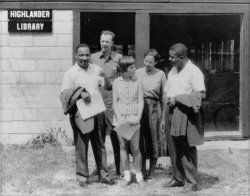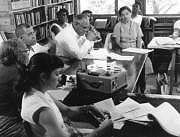
I'm the kind of person that, when I move to a new place, I like to learn the history and geography of the area. It's taken me three years and the passing of an amazing woman to uncover the world-changing history of Monteagle, TN.
Monteagle is a little town on top of the Cumberland Plateau. It's advertised as the "highest point between Chicago and Miami". 45 minutes away from my doorstep is an unsuspecting collection of gas stations and restaurants. These days, I make the drive every week to attend class at Sewanee, University of the South. It's a beautiful area with caves and waterfalls on every turn, but what I hadn't realized is that ideas that sparked the most profound social movement in our country were discussed there.
5 months before her famous decision to stay in her seat on the bus, Rosa Parks had attended
Highlander Folk School in Monteagle. Highlander was founded by a man from Savanna, TN named Miles Horton. After studying with the likes of Reinhold Neibuhr at Union Seminary, Horton set out to start a school that would address the social issues in the surrounding area. The predominant issue of the time was the poor treatment of miners in the coal mines of the Cumberland Plateau. The situation was poor as food intended for the workers was being withheld. Horton worked to instruct the miners on worker's rights. Horton's wife spent time with the families. At one point she learned a song from the wives of the embattled miners.
Years later Mrs. Horton taught that song to Pete Seger and others as they gathered at Highlander for groundbreaking meetings on desegregation and civil rights. They changed the words a little and made popular the old song "We Shall Overcome." Rosa Parks, Martin Luther King, jr., and other activists-to-be came to Highlander and learned (among other things) of Ghandi's ideas of non-violent protest.

Yesterday, a childhood friend of Ms. Parks recalled what Rosa had taken away from Highlander. At times of worship, she had been told repeatedly that she was a beloved child of God. And 5 months later, on that bus, she remembered those words and found the strength to quietly tear down walls.
After Rosa's time at Highlander, it fell victim to outside attacks, and was shut down by the state of Tennessee for various violations of segregation laws. It was re-established in East Tennessee where the work of the Highlander Center carries on, currently addressing the plight of Appalachian communities.
Sometimes, even when I'm not aware of it, I search for holy ground. I want to know that I'm connected to God's Kingdom on earth. Right in my backyard sits such a place.
I'm trying to find the exact grounds of the old Highlander in Monteagle. If anyone has any info on this, let me know!
Peace of Christ




